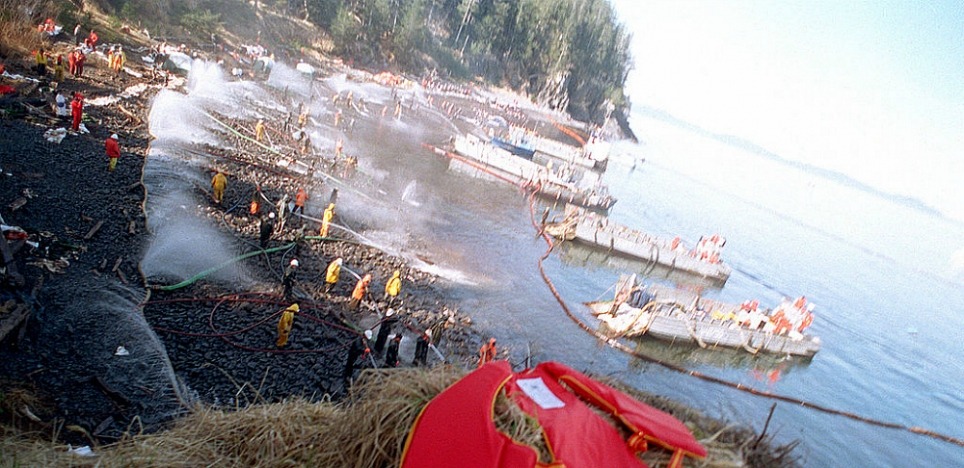On March 24, 1989, an oil tanker called the Exxon Valdez struck a reef in Alaska's Prince William Sound. Nearly 11 million gallons of crude oil spilled and — worsened by a delayed response and strong wind and waves — polluted 1,300 miles of shoreline, as well as the sound and adjacent waters. Investigators later learned that an unlicensed third mate had been steering the massive ship while the captain was drinking.
Exxon payed billions in clean-up costs and restoration, but that could not undo the terrible and tragic damage to a sensitive ecosystem that served as habitat to sea otters, seals, orcas, bald eagles, seabirds, and salmon, among others. Fishermen in shoreline villages went bankrupt. Heartbreaking images of oil-covered creatures led to widespread public mourning and outrage.
The U.S. Congress responded to the spill by passing the Oil Pollution Act of 1990, signed into law by President George H. W. Bush. It raised the penalties placed on companies responsible for oil spills and required that all oil tankers in U.S. waters have a double-hull design, decreasing the chance that a collision would result in a spill.
To Name This Day . . .
 Quotes
Quotes
A disaster like the Exxon Valdez oil spill cannot be seen as anything other than horrific. It does give us an opportunity, though, to consider how to keep something similar from happening again. Which of the following quotes most inspires you to change your own habit patterns in ways that protect Earth and her inhabitants?
“Our civilization had no notion of our ability to destroy and our inability to fix it.”
— Charles Wohlforth, Anchorage Daily News reporter
"We noticed there was this bathtub ring and I thought it was algae or mussels or something at first. And we got really close to the wall, and we realized it was oil. It was all oil. We also noticed there were lots of big black blobs and we started hauling some of those out of the water, and they were dead sea otters and dead sea birds, that were totally unrecognizable because they were just completely coated with this thick emulsified oil."
— Anne Castellina, Superintendent at the Kenai Fjords National Park
"It was hard on my family. At one point my middle daughter turned to me as I said, 'I got to go to another oil spill meeting.' And she looked at me and she said: 'Mommy we are important too.' And my heart just about broke."
— Anne Castellina, Superintendent at the Kenai Fjords National Park
“I really didn’t want to tell people how hopeless it was, as far as getting the oil off the water anytime soon.”
— Frank Larossi, President of Exxon Shipping
"You have fishing families that were so devastated that they've never recovered. And some of the species that were destroyed back in 1989 just have not come back."
— John Devens, former Mayor of Valdez
 Spiritual Practices
Spiritual Practices
In Stepping Into Freedom: An Introduction to Buddhist Monastic Training, Zen master Thich Nhat Hanh writes this prayer to say while washing your hands:
"Water flows over these hands.
May I use them skillfully
to preserve our precious planet."
